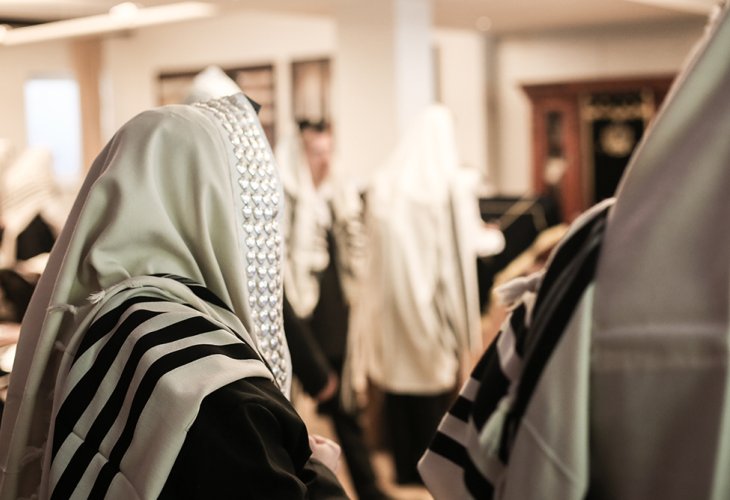Jewish Law
His Prayers Are Disturbing Yours. Now What?
What can a person do if someone else's loud praying doesn't allow him to focus?
 (Photo: shutterstock)
(Photo: shutterstock)The Story
Once again, Shimon tried to concentrate on the words of the prayer, but without success. The bench he was sitting on swayed back and forth to the rhythm of the person sitting beside him. The young man's eyes were closed and his brow was furrowed with concentration. From time to time his voice rose as he recited parts of the prayers aloud. Shimon frowned and tried to focus but it just wasn't happening. Even when his neighbor wasn't praying out loud, even when the swaying stopped for a few moments, Shimon sat as tense as a coiled spring, anticipating the next outburst.
Every few minutes he debated with himself whether to say something. Should he tap the young man on the shoulder and explain how much his enthusiastic prayer was ruining his own? But... this was a synagogue, after all. People came there to pray. Doesn't everyone have the right to pray as their soul desires? And, Shimon couldn't help admitting to himself that there was something beautiful about a Jew so immersed in his conversation with Hashem. How could he prevent something so special from happening?
Shimon decided, once and for all, to make a superhuman effort and overcome his frustration. He would accept the situation as it was and make peace with it. That way, he wouldn't feel the jolt every time the young man raised his voice or rocked the bench especially enthusiastically. And yet... even though he tried, his own focus was still so far from where he wanted it to be. What should he do?
A Torah Response
If someone is praying aloud, but not too loudly, that is their right. A synagogue is not a place where people engage only in silent prayer. On the other hand, if someone is clearly exceeding the acceptable noise threshold, the matter requires addressing.
If it's a one-time occurrence, someone bothered by the distraction can move away from their regular seat. If it's a recurring phenomenon, however, it's advisable to ask the gabbai (synagogue manager) to speak to the person. People find it easier to accept suggestions from gabbaim who are responsible for maintaining order in the synagogue than they do from other worshippers. (The gabbai should therefore be careful not to let the person know that another worshipper requested the intervention).
The decision whether to comment or not also depends on the age of the person making the disturbance. If the person is elderly, one should think twice before acting, as such a person might be very sensitive about their dignity. Even if one decides to ask the gabbai to speak to him, this shouldn't be done in front of others.
A community newsletter from a certain town once featured the following story:
"One morning, an unfamiliar young man entered our synagogue. He put on tefillin, sat down on a bench, and began swaying vigorously back and forth. The bench wasn't fastened to the floor and it creaked and groaned with each of the young man's movements. The noise was incredibly irritating, but the man didn't appear to notice.
"A few minutes passed, and people were starting to glance around and look for the source of the noise. When they figured out where it was coming from, they gave the young man pointed looks, as if to say, 'What's wrong with you? Stop making that noise!' But the young man was immersed in prayer, his eyes closed or focused on his siddur (prayer book) as he rocked back and forth, and the bench continued to 'sing along.'
"By the time prayers ended, I was a bundle of nerves. What inconsiderate behavior, what a lack of manners. I decided to approach him. The young man looked at me with puzzled eyes, as if he didn't understand what was wanted of him. He was embarrassed and confused by the angry glances directed at him and it was clear he didn't understand why.
"'You were making an unbearable noise,' I yelled at him, pointing at the creaky bench. 'I couldn't concentrate for even a minute.'
"The young man swallowed, and put his hand in his pocket and took out... a hearing aid. 'I'm so sorry,' he said uncomfortably. 'I only just realized that I forgot to switch it on.' There are no words that can describe my distress and pangs of conscience, even though the young man promised he forgave me with all his heart. For days and weeks, the guilty feelings continued to accompany me and I couldn't put the young man's embarrassed face out of my mind.
"Many things have changed for me since that incident. I hope that publishing these words will inspire others to enhance their observance of the mitzvah to judge others favorably, and that this will be an atonement for me."
From the book "Man's Duty in His World - Moral and Character Issues for the Whole Family."

